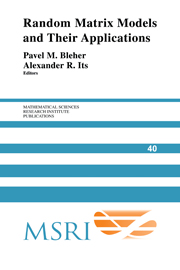Book contents
- Frontmatter
- Contents
- Preface
- Symmetrized Random Permutations
- Hankel Determinants as Fredholm Determinants
- Universality and Scaling of Zeros on Symplectic Manifolds
- z-Measures on Partitions, Robinson-Schensted-Knuth Correspondence, and β = 2 Random Matrix Ensembles
- Phase Transitions and Random Matrices
- Matrix Model Combinatorics: Applications to Folding and Coloring
- Interrelationships Between Orthogonal, Unitary and Symplectic Matrix Ensembles
- Dual Isomonodromic Tau Functions and Determinants of Integrable Fredholm Operators
- Functional Equations and Electrostatic Models for Orthogonal Polynomials
- Random Words, Toeplitz Determinants, and Integrable Systems I
- Random Permutations and the Discrete Bessel Kernel
- Solvable Matrix Models
- The τ-Function for Analytic Curves
- Integration over Angular Variables for Two Coupled Matrices
- Integrable Lattices: Random Matrices and Random Permutations
- SL(2) and z-Measures
- Some Matrix Integrals Related to Knots and Links
Universality and Scaling of Zeros on Symplectic Manifolds
Published online by Cambridge University Press: 25 June 2025
- Frontmatter
- Contents
- Preface
- Symmetrized Random Permutations
- Hankel Determinants as Fredholm Determinants
- Universality and Scaling of Zeros on Symplectic Manifolds
- z-Measures on Partitions, Robinson-Schensted-Knuth Correspondence, and β = 2 Random Matrix Ensembles
- Phase Transitions and Random Matrices
- Matrix Model Combinatorics: Applications to Folding and Coloring
- Interrelationships Between Orthogonal, Unitary and Symplectic Matrix Ensembles
- Dual Isomonodromic Tau Functions and Determinants of Integrable Fredholm Operators
- Functional Equations and Electrostatic Models for Orthogonal Polynomials
- Random Words, Toeplitz Determinants, and Integrable Systems I
- Random Permutations and the Discrete Bessel Kernel
- Solvable Matrix Models
- The τ-Function for Analytic Curves
- Integration over Angular Variables for Two Coupled Matrices
- Integrable Lattices: Random Matrices and Random Permutations
- SL(2) and z-Measures
- Some Matrix Integrals Related to Knots and Links
Summary
1. Introduction
A well-known theme in random matrix theory (RMT), zeta functions, quantum chaos, and statistical mechanics, is the universality of scaling limits of correlation functions. In RMT, the relevant correlation functions are for eigenvalues of random matrices (see [De; TW; BZ; BK; So] and their references). In the case of zeta functions, the correlations are between the zeros [KS]. In quantum dynamics, they are between eigenvalues of ‘typical’ quantum maps whose underlying classical maps have a specified dynamics. In the ‘chaotic case’ it is conjectured that the correlations should belong to the universality class of RMT, while in integrable cases they should belong to that of Poisson processes. The latter has been confirmed for certain families of integrable quantum maps, scattering matrices and Hamiltonians (see [Ze2; RS; Sa; ZZ] and their references). In statistical mechanics, there is a large literature on universality of critical exponents [Car]; other rigorous results include analysis of universal scaling limits of Gibbs measures at critical points [Sin]. In this article we are concerned with a somewhat new arena for scaling and universality, namely that of RPT (random polynomial theory) and its algebro-geometric generalizations [Han; Hal; BBL; BD; BSZ1; BSZ2; SZ1; NV]. The focus of these articles is on the configurations and correlations of zeros of random polynomials and their generalizations, which we discuss below. Random polynomials can also be used to define random holomorphic maps to projective space, but we leave that for the future. Our purpose here is partly to review the results of [SZ1; BSZ1; BSZ2] on universality of scaling limits of correlations between zeros of random holomorphic sections on complex manifolds.
Information
- Type
- Chapter
- Information
- Random Matrix Models and their Applications , pp. 31 - 70Publisher: Cambridge University PressPrint publication year: 2001
Accessibility standard: Unknown
Why this information is here
This section outlines the accessibility features of this content - including support for screen readers, full keyboard navigation and high-contrast display options. This may not be relevant for you.Accessibility Information
- 1
- Cited by
